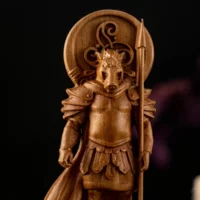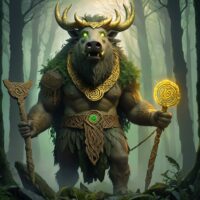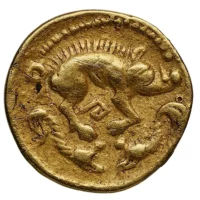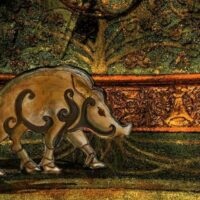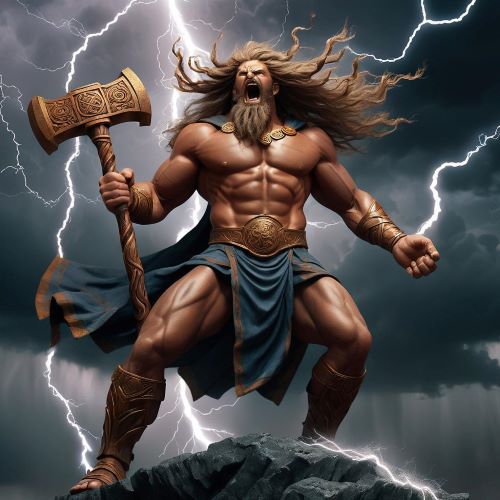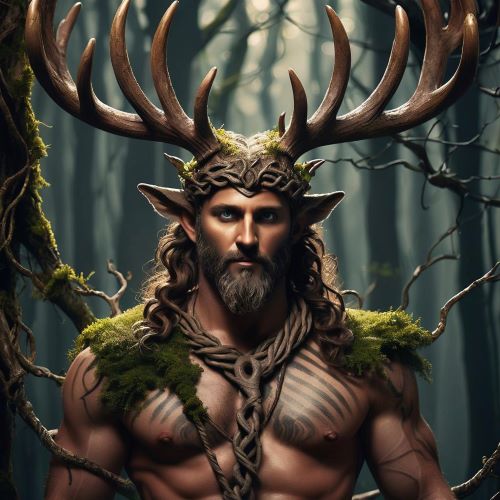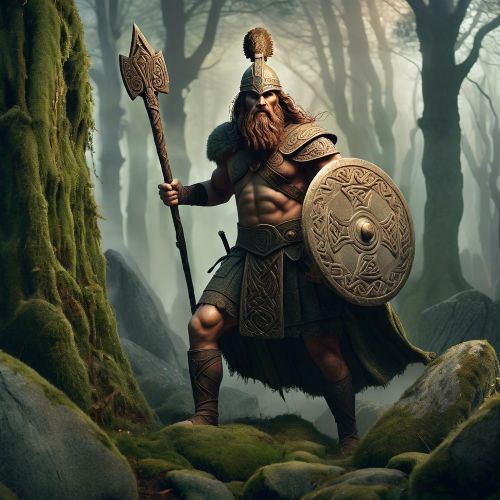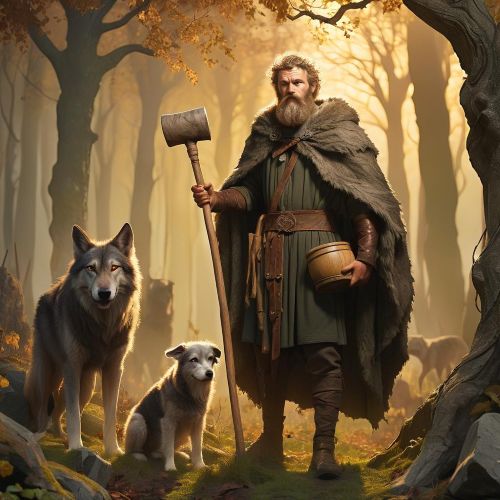Moccus : God of Boars
Listen
At a glance
| Description | |
|---|---|
| Origin | Gaulish Mythology |
| Classification | Gods |
| Family Members | N/A |
| Region | France, Italy |
| Associated With | Boars, Pigs |
Moccus
Introduction
Moccus is a prominent deity from the Gaulish Celtic pantheon, particularly venerated by the Lingones tribe in ancient northeastern France. His name, derived from the Gaulish word moccos, meaning pig or boar, signifies his strong association with these animals, which symbolized strength, fertility, and protection in Celtic culture. Though Moccus is not as widely known today, his worship reflects the deep spiritual relationship early Celts had with the natural world. Like many Celtic deities, Moccus was syncretized with Roman gods—especially Mercury—during the Roman occupation, blending native traditions with classical mythology in a complex web of belief and reverence.
Physical Traits
Unlike anthropomorphic deities commonly found in Mediterranean traditions, Moccus is often represented through his symbolic animal form—the wild boar. This creature held immense cultural weight among the Celts, associated with virility, ferocity, and untamed strength. One of the most notable depictions comes from the statue found in Euffigneix, where a figure wearing a torc displays a prominent boar relief, indicating divine or totemic significance.
In artistic and mythological reconstructions, Moccus may be imagined as a large, bristled boar with glowing eyes and commanding presence, patrolling forests and fields. The animal’s connection to the earth and its combative nature likely made Moccus a figure of both spiritual protection and primal energy. In coins and bronze artifacts, boars appear frequently—further reinforcing the reverence surrounding this animal and, by extension, Moccus himself.
Family
Traditional mythology does not offer a well-defined genealogy for Moccus. Unlike other pantheons where gods are linked through family trees, Celtic deities like Moccus were often worshipped locally, with strong tribal affiliations rather than lineage. As a divine figure for the Lingones tribe, he may have been regarded as a tribal guardian or spiritual ancestor.
Scholarly interpretations occasionally align Moccus with Lugus, a pan-Celtic deity associated with skills and commerce, due to Moccus’s later Roman identification with Mercury. While not a familial bond in the traditional sense, this symbolic relationship connects him to a broader divine network. In some votive inscriptions, Moccus appears in the context of family dedications, hinting at his role in personal worship and community identity rather than divine lineage.
Other names
While “Moccus” is the most commonly used name, variations and titles emerged through regional dialects and Roman integration. During the Roman period, he was often referred to as Mercurius Moccus, combining his Gaulish identity with the Roman god Mercury. This fusion wasn’t merely nominal—it reflected the shared characteristics of both deities, especially their protective, guiding, and fertile attributes.
Another title used by modern scholars is “the God of Euffigneix,” derived from the site of the most notable artifact associated with him. The name “Moccos” also appears in inscriptions and personal names, indicating how embedded his symbolism was within everyday life. These various titles show how his worship evolved and adapted, continuing to resonate across time and culture.
Powers and Abilities
As a deity deeply connected to the wild boar, Moccus represents strength, endurance, and resilience. Boars were considered sacred animals in Celtic rituals, often linked to agricultural cycles and fertility rites. Moccus’s presence ensured the fertility of lands, healthy harvests, and the protection of communities from misfortune or invasion. He was especially revered during seasonal transitions, when offerings would be made for prosperity and abundance.
Through his Roman syncretic identity as Mercury, Moccus also acquired traits related to communication, travel, and trade. This dual identity gave him a wider range of influence—bridging the wild, primal energy of the boar with the refined attributes of guidance and negotiation. In healing practices, particularly those involving springs and natural sanctuaries, Moccus was believed to aid physical recovery and spiritual cleansing.
Folklore suggests that Moccus had the power to transform those who disrespected nature, sometimes cursing them with boar-like features. These tales served as cautionary myths, reinforcing communal values of respect for the environment and sacred customs.
Modern Day Influence
Although the direct worship of Moccus waned after the Christianization of Gaul, his legacy endures through neopagan movements and revived Celtic spiritual practices. Groups such as the Shrine of the Irish Oak honor him as a solar and agricultural deity, often celebrating his festival on the winter solstice to mark the return of light and life.
Modern Druids, Wiccans, and polytheists invoke Moccus in rituals focused on fertility, protection, and hunting. His image—whether as a fierce boar or a torc-wearing guardian—appears in artwork, literature, and even modern gaming lore. The continued popularity of the boar in heraldry, fantasy stories, and popular culture can often be traced back to ancestral deities like Moccus, who once represented the raw, sustaining forces of the natural world.
Moccus’s influence is also seen in environmental spirituality, where he embodies the balance between nature’s gifts and its wild, uncontrollable power. As societies increasingly look to ancient beliefs for ecological wisdom, figures like Moccus provide a meaningful connection to sustainability and respect for the earth.
Related Images
Source
Green, M. (1989). Symbol and image in Celtic religious art. Routledge.
Green, M. (1997). Dictionary of Celtic Myth and Legend. Thames and Hudson Ltd.
Jouët, P. (2012). Dictionnaire de mythologie et de la religion celtiques. Yoran Embanner.
MacKillop, J. (2004). A Dictionary of Celtic Mythology. Oxford University Press.
Olmsted, G. S. (2017). The gods of the Celts and the Indo-Europeans (Revised ed.).
Thévenot, É. (1968). Divinités et sanctuaires de la Gaule. Fayard.
Whatmough, J. (n.d.). Etymology and interpretation of Moccus.
(2007). Moccus. Wikipedia. Retrieved from https://en.wikipedia.org/wiki/Moccus
(2003). Moccus. Retrieved from https://www.maryjones.us/jce/moccus.html
(2025). Moccus. Retrieved from https://the-war-of-the-sword.fandom.com/wiki/Moccus


